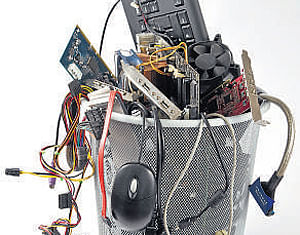
Bangalore generated over 37,000 metric tonne (MT) of electronic waste in 2012 and stands third in the country after Mumbai and Navi Mumbai generating 61,500 MT followed by NCR (National Capital Region) generating 43,000 MT of e-waste, says a Assocham study.
Addressing a seminar on E-Waste, Department of Forest, Ecology and Environment Principal Secretary N Sivasailam said though Bangalore is one of the top e-waste generators, there is no equal facility available for recycling them. “If private sectors come up with comprehensive plan to set up e-waste recycling units, the government would help them set up these processing units. There is a need to create awareness on e-waste recycling,” he added.
Assocham Southern Region Director Asad Wasi said, of the 37,000 MT e-waste generated in Bangalore, only 12.5 per cent was recycled. “Nearly 70 per cent of e-waste is handled by unorganised sector and remaining 30 per cent by organised sectors registered with pollution control board and process e-waste scientifically. We want more number of organised players handling e-waste to avoid outdated methods adopted by unorganised sector which causes health hazards to those dealing with them and environmental hazards in general,” he added.
According to Assocham report, Indian consumer electronic and durables sector was valued at Rs 340 billion in 2012 and the same year saw India producing over eight lakh MT of e-waste. It is expected that by 2017, e-waste generation will grow up to 21,10 lakh MT. Last year, over 23 million units of colour televisions were sold, in 2011, 12 million units of refrigerators and six million units washing machines were sold.
The electronic goods market is dominated by the urban areas with 65 per cent, while rural areas make up the remaining 35 per cent. Television and electrical equipment contributes to 75 per cent of e-waste followed by 20 per cent by computers, two per cent by mobile phones and three per cent by others.The report said 70 per cent of e-waste contributors are from government, public and private industries. Households contribute to around 15 per cent and the remaining 15 per cent from manufacturing industries. e-waste mainly comprises iron and steel amounting to 50 per cent, plastics 21 per cent, non-ferrous metals 13 per cent and other constituents 16 per cent. The report said Indian organised e-waste management services market in 2012 was about Rs one billion to Rs two billion. There are around 72 formal e-waste recycling units in India with a capacity of recycling 1.75 lakh tonne per annum.